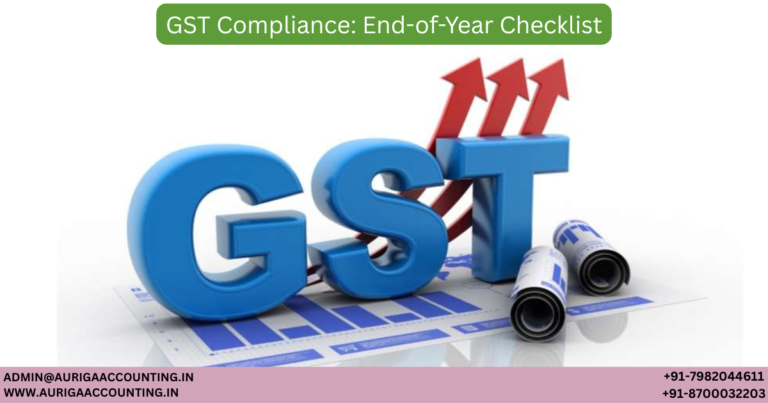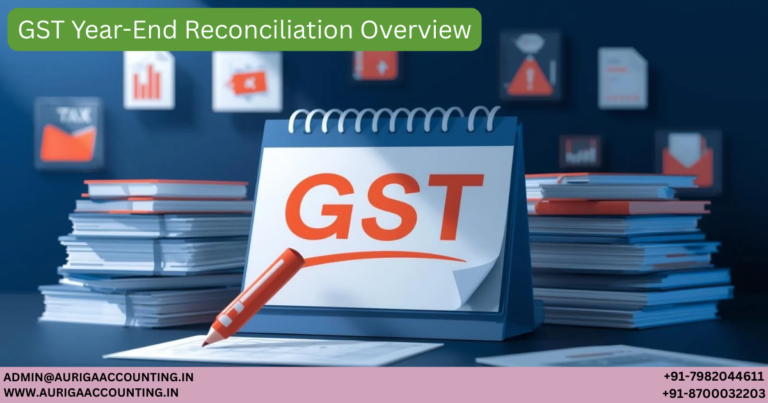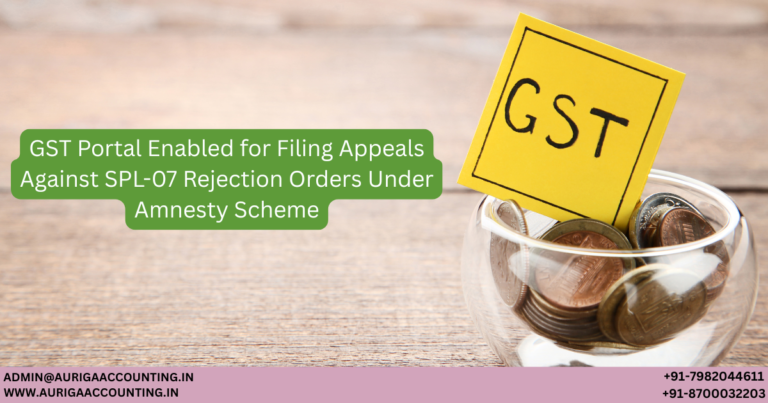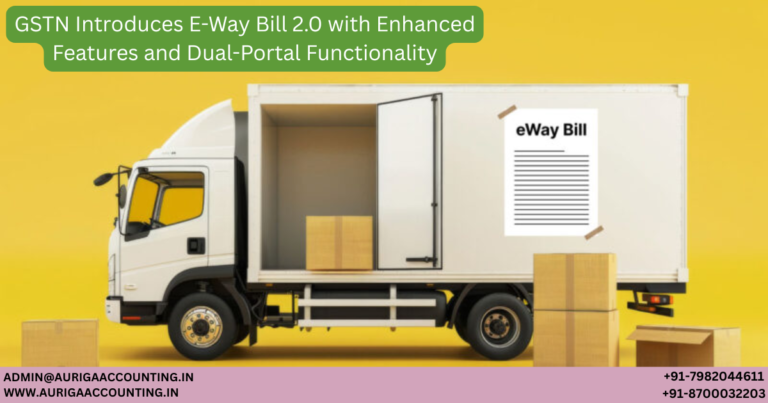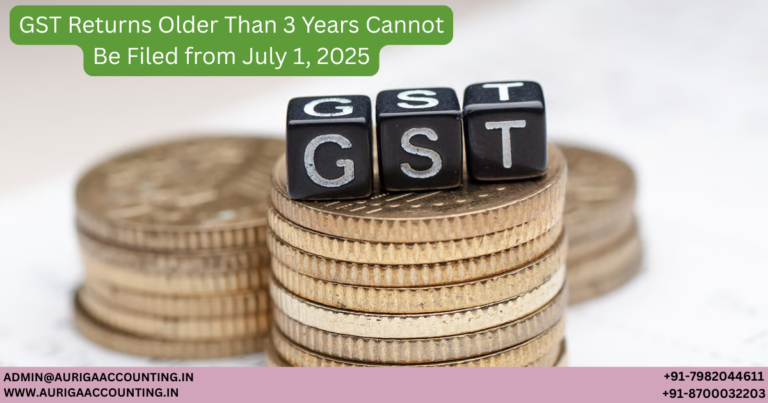Shivani is an accomplished writer known for her ability to simplify complex legal topics into clear, practical insights. Her content equips entrepreneurs with the essential knowledge to confidently navigate business laws, helping them launch and manage their ventures with greater ease and clarity.
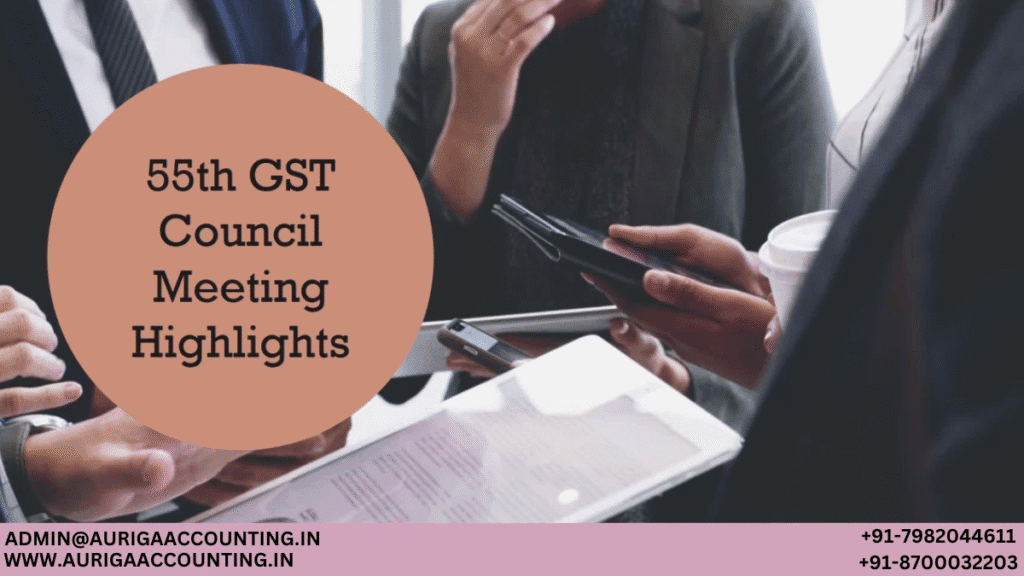
Top Highlights from the 55th GST Council Meeting
Introduction
ToggleThe 55th GST Council Meeting, held on December 21, 2024, delivered a range of significant decisions and clarifications aimed at simplifying tax processes, improving business compliance, and tackling crucial issues within the Goods and Services Tax (GST) system. The meeting introduced important changes, including GST exemptions, rate revisions, and procedural enhancements. These measures are intended to offer relief to various sectors, address compliance challenges, and make the GST framework more efficient. This article explores the key highlights and detailed outcomes of the meeting
Key Highlights from the 55th GST Council Meeting
The recent 55th GST Council Meeting introduced several important decisions aimed at refining GST rules and providing clarity on various issues. Below are the major outcomes:
Important Decisions:
Extension for Group of Ministers (GoM) Reports:
The GoM, tasked with examining compensation cess, rate rationalization, and health insurance issues, received an extension to submit its report.GST Exemption for Payment Aggregators:
Payment aggregators processing transactions below ₹2,000 are now exempt from GST. This exemption, however, does not apply to payment gateways or fintech services that do not handle fund settlements.No GST on Penal Charges for Loan Non-Compliance:
Penal charges collected by banks and NBFCs from borrowers for failing to comply with loan terms are exempt from GST.Exemption for Agriculturist Supplies:
Supplies of dried black pepper and raisins made by agriculturists will not attract GST.Clarification on GST for Caramelised Popcorn:
Caramelised popcorn will be taxed like other sugar-added products, meaning it will not qualify for the 5% GST rate that applies to salted popcorn (classified as namkeen).Delayed Decision on GST for Food Delivery Apps:
The Council postponed discussions on GST applicable to food delivery charges by quick commerce platforms and food delivery apps.Taxation on Used Electric Vehicles (EVs):
Sales of used EVs between individuals are exempt from GST.
Businesses selling used EVs after refurbishment will be liable to pay 18% GST on the margin (the difference between purchase and sale price), similar to other used vehicles.
Reduced Compensation Cess for Merchant Exporters:
The rate of Compensation Cess on supplies to merchant exporters has been recommended to be reduced to 0.1%, aligning it with the GST rate.Exemption for IAEA Inspection Imports:
Imports of equipment and consumable samples by the International Atomic Energy Agency (IAEA) inspection team will be exempt from IGST, subject to certain conditions.
Changes in GST Rates on Goods and Services
Several goods and services saw GST rate changes or clarifications during the meeting:
| S. No. | Goods/Services | HSN/SAC Code | Current Rate | Recommended Rate |
|---|---|---|---|---|
| 1 | Fortified rice kernels | 1904 | 18% | 5% |
| 2 | Gene therapy for life-threatening diseases | – | Taxable | Exempted |
| 3 | Food for free distribution under govt. programs | 19 or 21 | Higher taxed | 5% |
| 4 | ACC blocks (>50% fly ash) | 6815 | 5% | 12% |
| 5 | Fresh/dried black pepper & dried raisins by agriculturists | 904 | 5% | No GST |
| 6 | Approved skill training partners of NSDC | 9992 | 18% | Exempted |
| 7 | Sale of used EVs between individuals | – | Higher taxed | 5% |
| 8 | Sale of used EVs by businesses after refurbishment | – | 12% | 18% on profit margin |
| 9 | Sub-systems of Long Range Surface to Air Missile (LRSAM) | 9023 | Taxable | Exempted |
| 10 | Bank/NBFC penal charges for loan defaults | – | Taxed | Exempted. |
Key Decisions on Services from the 55th GST Council Meeting
The 55th GST Council Meeting introduced important updates to the taxation and compliance framework for various services, aiming to simplify procedures and improve transparency for both businesses and consumers.
Sponsorship Services under Forward Charge Mechanism
The supply of sponsorship services by body corporates will now be subject to the Forward Charge Mechanism (FCM). This move is intended to enhance compliance and streamline the taxation process for sponsorship-related transactions.
GST Exemption on Contributions to Motor Vehicle Accident Fund
Contributions made by general insurance companies from third-party motor vehicle insurance premiums to the Motor Vehicle Accident Fund (established under Section 164B of the Motor Vehicles Act, 1988) are now exempt from GST. This fund supports compensation and cashless medical treatment for road accident victims, including hit-and-run cases.
Amendments to Hotel Tariff and Restaurant Services Taxation
The existing definition of “declared tariff” will be removed and replaced by a new framework linking GST rates to the actual value of accommodation supplies by hotels. Key points include:
Hotels will apply GST on restaurant services based on the previous financial year’s average value of accommodation supply:
18% GST with Input Tax Credit (ITC) if the value exceeds ₹7,500 per unit.
5% GST without ITC in all other cases.
Hotels may opt to pay 18% GST with ITC by declaring this choice at the beginning of the financial year or during registration.
These changes will be implemented from 1st April 2025, allowing a smooth transition period.
Composition Levy Taxpayers Excluded from Reverse Charge Mechanism (RCM)
Taxpayers registered under the composition levy scheme will be exempt from the applicability of the Reverse Charge Mechanism for renting of commercial or immovable property (as per entry Sr. No. 5AB, Notification No. 09/2024-CTR dated 08.10.2024). The period from 10th October 2024 until the issuance of the formal notification will be regularised on an “as is where is” basis
GST Clarifications and Amendments – 55th GST Council Meeting
The 55th GST Council Meeting introduced several important clarifications and amendments to enhance compliance, simplify procedures, and address long-standing ambiguities in the GST framework.
Key Amendments to the CGST Act and Rules
Invoice and Credit Note Adjustments: Amendments were made concerning invoice management and the reversal of input tax credit in relation to credit notes, streamlining the reconciliation and filing process.
GST Return Filing Enhancements: Updates were introduced to improve the accuracy and efficiency of the GST return filing mechanism.
Waiver of Late Fees for GSTR-9C
Relief for Past Filing Delays: Late fees for delayed filing of FORM GSTR-9C for financial years 2017-18 to 2022-23 will be waived, provided the returns are filed by March 31, 2025.
Reduced Pre-Deposit for Penalty Appeals
The pre-deposit requirement for filing GST appeals related to penalty orders has been reduced from 25% to 10%, providing significant relief to taxpayers facing litigation.
Temporary GST Identification for Unregistered Persons
Individuals who are not registered under GST but need to make specific tax payments can now be issued temporary GST identification numbers, enabling smoother compliance without full registration.
Other Key Updates on Goods and Services
Revised GST Rate on Used Vehicles
The GST rate for the sale of used vehicles, including electric vehicles (EVs), has been revised:
Increased to 18% from the earlier 12%, applicable to most used vehicles.
Exemptions: Vehicles already taxed at 18%, such as:
Petrol vehicles with ≥1200 cc engine and ≥4000 mm length
Diesel vehicles with ≥1500 cc engine and ≥4000 mm length
SUVs
Tax Base: GST will be levied only on the margin value (sale price minus purchase price or depreciated value, as applicable).
Applicability: These changes do not apply to sales by unregistered individuals.
Classification of ACC Blocks
Autoclaved Aerated Concrete (ACC) blocks containing more than 50% fly ash will fall under HS code 6815 and attract 12% GST.
GST Exemption for Agriculturists
Fresh and dried black pepper and raisins supplied directly by agriculturists are fully exempt from GST.
Revised Definition of ‘Pre-Packaged and Labelled’ Goods
The definition now includes all retail commodities weighing up to 25 kg or 25 litres, which are subject to declaration requirements under the Legal Metrology Act and associated rules.
GST Rates on Popcorn Varieties
Ready-to-eat Popcorn:
5% GST if sold loose (not pre-packaged and labelled)
12% GST if sold as pre-packaged and labelled
Caramelised Popcorn: Treated as sugar confectionery (HS code 1704 90 90) and attracts 18% GST.
These clarifications aim to resolve past classification disputes and will be regularised on an “as is where is” basis.
Exemption on Penal Charges by Banks and NBFCs
No GST will be levied on penal charges imposed by banks and NBFCs for non-compliance with loan terms, ensuring better clarity and consistency in financial sector taxation.
Trade Facilitation Measures Announced in the 55th GST Council Meeting
The 55th GST Council Meeting introduced several important trade facilitation measures aimed at simplifying compliance, addressing legacy issues, and bringing greater clarity to key GST provisions. These initiatives are expected to enhance business efficiency and streamline tax processes across sectors.
1. Tax Treatment for Goods in SEZs and FTWZs
To align GST with global best practices, the Council clarified that:
Goods stored in Special Economic Zones (SEZs) or Free Trade Warehousing Zones (FTWZs) will not attract GST until:
They are exported, or
Cleared for sale in the domestic market.
This mirrors the approach used for customs bonded warehouses, offering relief to businesses engaged in international trade.
2. Revised GST Framework for Vouchers
The GST Council has clarified the treatment of vouchers (e.g., gift cards, discount codes, etc.):
Vouchers will not be classified as goods or services, eliminating ambiguity in tax treatment.
When issued directly by a company, they are not subject to GST.
When issued through an agent, GST applies only to the agent’s service fees.
Services linked to vouchers (e.g., marketing, advertising, customer care) will be taxed based on the actual consideration charged.
Unused vouchers (breakage) will not attract GST, helping businesses manage unclaimed liabilities without tax exposure.
3. Clarifications on Input Tax Credit (ITC) and Return Filing
ITC Reversal Not Required for Certain E-Commerce Transactions:
Online platforms are not required to reverse ITC on supplies where they are directly paying the GST, reducing compliance complexity.ITC on Indirect Deliveries:
If goods are delivered to a third-party location (such as a warehouse or agent) on behalf of a registered buyer, the buyer can still claim ITC, provided the transaction is properly documented.Late Fee Waiver for Annual Returns (FY 2017–18 to 2022–23):
Businesses that missed the deadline for filing GSTR-9 and GSTR-9C for past years can now avoid late fees by filing these returns on or before March 31, 2025.
This one-time relief offers a clean slate to businesses with historical non-compliance.
Key Measures to Strengthen and Simplify GST Compliance
Highlights from the 55th GST Council Meeting
The 55th GST Council Meeting introduced several critical measures aimed at improving GST compliance, increasing transparency, and reinforcing the regulatory structure. These initiatives reflect the government’s intent to modernize the GST ecosystem and address risks of tax evasion.
1. Implementation of Track and Trace Mechanism
To curb tax evasion and improve supply chain visibility, the Council recommended the introduction of a Track and Trace Mechanism by amending the CGST Act through a new Section 148A.
Key features:
Enables the government to mandate unique identification markings on certain commodities or their packaging.
Aims to improve traceability from production to end-use, particularly for high-risk or evasion-prone goods.
This framework is designed to ensure greater transparency, accountability, and streamlined monitoring throughout the supply chain.
2. Clarification on Address Details for Online Services
To standardize compliance for online service providers, the Council issued a clarification concerning transactions with unregistered recipients:
Suppliers of services such as Online Information Database Access and Retrieval (OIDAR) and online money gaming must clearly mention the recipient’s state on the tax invoice.
This state will be treated as the recipient’s location under Section 12(2)(b) of the IGST Act, 2017, for determining the place of supply.
Ensures consistent application of GST rules and proper allocation of tax revenues between states
Other Legal and Procedural Measures from the 55th GST Council Meeting
The 55th GST Council Meeting introduced a range of legal and procedural amendments aimed at streamlining GST operations, enhancing clarity, and easing compliance burdens for taxpayers. Key changes include updates to terminology, appeal procedures, credit distribution mechanisms, and system enhancements.
1. Clarification on “Plant and Machinery” Definition
To remove ambiguity in interpretation, the Council has recommended amending the terminology from “plant or machinery” to “plant and machinery”, effective retrospectively from July 1, 2017. This clarification aligns with the intended scope for input tax credit eligibility.
2. Reduced Pre-Deposit for Penalty Appeals
To make the appeals process more accessible, the required pre-deposit for appeals involving penalties (excluding tax demands) has been reduced from 25% to 10%:
Applies to appeals under Section 107 (Appellate Authority) and Section 112 (Appellate Tribunal).
3. Clarification of “Local Fund” and “Municipal Fund”
To prevent misinterpretation, the Council has clarified the definitions of Local Fund and Municipal Fund within the GST framework. This will promote uniform understanding and application across all jurisdictions.
4. Amendments to Input Service Distributor (ISD) Rules
The ISD mechanism will be updated to facilitate smoother distribution of input tax credits, particularly for services taxed under the Reverse Charge Mechanism (RCM). These changes will:
Enable cross-state distribution of credits by head offices or shared service centers.
Come into effect from April 1, 2025, allowing adequate time for system adaptation.
5. Temporary GST Identification for Unregistered Persons
A new provision will empower tax officers to issue Temporary GST Identification Numbers to individuals or entities not required to register under GST but obligated to make specific tax payments. This step aims to:
Simplify compliance for occasional taxpayers.
Enable smoother processing of certain high-value or one-time transactions.
6. Increased Flexibility for Composition Scheme Taxpayers
Taxpayers registered under the Composition Scheme will now be allowed to:
Change their category of registration via a streamlined online form, reducing procedural complexity and enabling quicker adjustments in business operations.
7. Enhancements to the Invoice Management System (IMS)
To support better reconciliation and reporting, several upgrades are planned for the IMS:
Auto-generation of GSTR-2B: The system will auto-populate GSTR-2B based on supplier actions, improving accuracy in input tax credit claims.
Credit Note Adjustments: Clearer guidelines will require reversal of input tax credit where credit notes are issued, ensuring better compliance.
GSTR-3B Filing Dependency: Taxpayers will only be able to file GSTR-3B after their GSTR-2B becomes available, promoting consistency in returns
Press Release Summary – 55th GST Council Meeting
Access the official press release issued by the Ministry of Finance following the 55th GST Council Meeting, held on 21st December 2024. The release outlines comprehensive details of the key policy decisions, rate changes, procedural clarifications, and legal amendments approved during the meeting. It reflects the Council’s continued focus on simplifying GST compliance, providing sector-specific relief, and improving overall tax administration.
For a full overview of the deliberations and decisions, refer to the complete press release document
About the Author
shivani
February 23, 2026
new
January 8, 2026
January 8, 2026
January 6, 2026
January 2, 2026
January 2, 2026
December 31, 2025
December 29, 2025
December 29, 2025
December 29, 2025
December 27, 2025
December 27, 2025
December 26, 2025
December 16, 2025
December 13, 2025
November 27, 2025
November 27, 2025
November 26, 2025
November 25, 2025
November 21, 2025
November 20, 2025
November 20, 2025
November 20, 2025
June 16, 2025
June 13, 2025
June 11, 2025
June 9, 2025
June 5, 2025
June 5, 2025
June 5, 2025
June 5, 2025
June 4, 2025
June 4, 2025
June 3, 2025
June 3, 2025
May 31, 2025
May 31, 2025
May 30, 2025
May 30, 2025
May 30, 2025
May 29, 2025
May 29, 2025
May 29, 2025
May 29, 2025
May 28, 2025
May 28, 2025
May 27, 2025
May 24, 2025
May 23, 2025
May 22, 2025
February 1, 2024
September 7, 2023
September 7, 2023
September 6, 2023
September 6, 2023
September 5, 2023
September 5, 2023
September 5, 2023
September 5, 2023
September 4, 2023
September 4, 2023
September 4, 2023
September 4, 2023
September 1, 2023
September 1, 2023
September 1, 2023
September 1, 2023
August 30, 2023
August 30, 2023
August 30, 2023
August 29, 2023
August 29, 2023
August 29, 2023
August 29, 2023
August 28, 2023
August 28, 2023
August 28, 2023
August 28, 2023
August 28, 2023
August 26, 2023
August 26, 2023
August 26, 2023
August 26, 2023
August 25, 2023
August 25, 2023
August 25, 2023
August 25, 2023
August 24, 2023
August 24, 2023
August 24, 2023
August 24, 2023
August 22, 2023
August 22, 2023
August 22, 2023
August 22, 2023
August 22, 2023
August 21, 2023
August 21, 2023
August 21, 2023
August 21, 2023
RELATED ARTICLES
GST Compliance:...
GST Year-End...
Use a Virtual...
Auto-Populated...
No posts found



